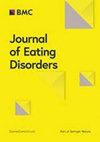Advocacy through storytelling: challenging eating disorders and eating disorders stigma
IF 3.5
3区 医学
Q2 NUTRITION & DIETETICS
引用次数: 0
Abstract
Although eating disorders (EDs) are among the most stigmatised mental illnesses, a number of individuals break past this stigma and engage in ED advocacy by sharing their recovery stories. Little is known, however, about the role of such advocacy in their healing journeys. To bridge this gap, the authors examined the role of autobiographical oral storytelling in the ED recovery of adult advocates. Autobiographical oral history interviews were carried out with adult advocates (n = 16) recovering from EDs. The data were analysed using a mixture of actantial and thematic analyses. Authors also used activity theory to categorise how storytelling was translated into concrete social actions. Results were then interpreted through frameworks of embodiment and the intersectionality of identity. Advocates chose to share their ED stories as a way to embody resilience and make meaning from their ED experiences. Beyond personal gains, the social benefits of sharing their stories included raising hope and openness to converse further with audiences, advocating for greater ED resources (e.g., ED literacy among school staff), and offering new training initiatives for healthcare professionals. The ties between storytelling and the unique aspects of one’s identity are also discussed. Engaging in advocacy through storytelling can positively affect both the advocates and the audiences with whom they connect. Future studies, informed by feminist biopsychosocial frameworks, can examine storytelling as a therapeutic intervention. Such frameworks serve as alternatives to biomedical models of EDs and mental illnesses. They also emphasise the need for broader changes that destabilise oppressive body cultures and display how storytelling can help mobilise change. Eating disorders (EDs) have been identified as one of the most stigmatised mental illnesses, making it difficult for individuals to seek professional help or disclose their mental health situation. Nevertheless, a handful of individuals become advocates who combat this stigma by sharing their personal struggles and ongoing healing journeys. The researchers of this study used a narrative-based approach to analyse the experiences of such advocates while identifying the personal and social benefits of their storytelling advocacy. The outcomes of this study suggested that advocates found these storytelling initiatives to be deeply meaningful because they were able to reflect on how far they have come while increasing hope among audiences that recovery is possible. The findings from this research support the ongoing need for novel interventions against ED stigma, including the potential to incorporate storytelling as a way to normalise conversations on EDs while enhancing the resilience of individuals undergoing recovery.通过讲故事进行宣传:挑战饮食失调症和饮食失调症的耻辱感
尽管饮食失调症(ED)是最受人鄙视的精神疾病之一,但仍有许多人通过分享自己的康复故事来打破这种鄙视,参与饮食失调症的宣传活动。然而,人们对这种宣传在他们的康复历程中所起的作用知之甚少。为了弥补这一空白,作者研究了自传体口述故事在成人倡导者的 ED 康复中的作用。作者对从 ED 康复的成年倡导者(n = 16)进行了自传体口述历史访谈。数据分析采用了活动分析和主题分析相结合的方法。作者还利用活动理论对如何将讲故事转化为具体的社会行动进行了分类。然后通过体现和身份交叉性框架对结果进行解释。倡导者选择分享他们的 ED 故事,以此体现抗逆能力,并从他们的 ED 经历中获得意义。除了个人收获之外,分享他们的故事所带来的社会效益还包括:提高了与受众进一步交流的希望和开放性、倡导提供更多的 ED 资源(例如,在学校教职员工中普及 ED 知识),以及为医疗保健专业人员提供新的培训计划。此外,还讨论了讲故事与个人身份独特性之间的联系。通过讲故事进行宣传,可以对宣传者及其所联系的受众产生积极影响。在女性主义生物心理社会框架的指导下,未来的研究可以将讲故事作为一种治疗干预手段进行研究。这些框架可以替代 ED 和精神疾病的生物医学模式。它们还强调需要进行更广泛的变革,以动摇压迫性的身体文化,并展示讲故事如何有助于动员变革。饮食失调症(EDs)被认为是最容易被污名化的精神疾病之一,这使得人们很难寻求专业帮助或公开自己的精神健康状况。尽管如此,仍有少数人通过分享他们的个人奋斗史和正在进行的治疗历程,成为消除这种耻辱感的倡导者。本研究的研究人员采用了一种基于叙事的方法来分析这些倡导者的经历,同时确定了他们通过讲故事进行倡导所带来的个人和社会效益。本研究的结果表明,倡导者认为这些讲故事的活动意义深远,因为他们能够反思自己已经走了多远,同时增强受众对康复的希望。这项研究的结果支持了对 ED 耻辱化的新型干预措施的持续需求,包括将讲故事作为一种方式,使有关 ED 的对话正常化,同时增强正在康复的个人的复原力。
本文章由计算机程序翻译,如有差异,请以英文原文为准。
求助全文
约1分钟内获得全文
求助全文
来源期刊

Journal of Eating Disorders
Neuroscience-Behavioral Neuroscience
CiteScore
5.30
自引率
17.10%
发文量
161
审稿时长
16 weeks
期刊介绍:
Journal of Eating Disorders is the first open access, peer-reviewed journal publishing leading research in the science and clinical practice of eating disorders. It disseminates research that provides answers to the important issues and key challenges in the field of eating disorders and to facilitate translation of evidence into practice.
The journal publishes research on all aspects of eating disorders namely their epidemiology, nature, determinants, neurobiology, prevention, treatment and outcomes. The scope includes, but is not limited to anorexia nervosa, bulimia nervosa, binge eating disorder and other eating disorders. Related areas such as important co-morbidities, obesity, body image, appetite, food and eating are also included. Articles about research methodology and assessment are welcomed where they advance the field of eating disorders.
 求助内容:
求助内容: 应助结果提醒方式:
应助结果提醒方式:


